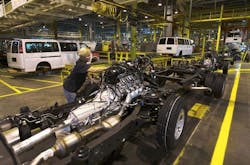For example, according to an analysis from ThomasNet within the firm’s 2013 Industry Market Barometer, reveals a disconnect growing between the growth of manufacturing companies and a lack of urgency recruiting fresh talent that – in the firm’s words – “threatens the future” of the sector.
Eileen Markowitz, president of ThomasNet, said the 1,200 American manufacturers responding to her form’s 2013 survey are effusive in describing how technological advances are improving their companies. As a result, they are growing, hiring, and increasing their production capacity to meet future demand, with nearly seven out of ten (67%) also focused on introducing new or innovative products/services this year, she noted.
But a closer look at the findings reveals a pending shift in workforce demographics that could put this progress on hold, according to Markowitz, ThomasNet.com’s survey found the manufacturing sector is heavily populated – surprise, surprise!! – by employees who are 45 and older.With so-called “Generation Y” individuals aged 18 to 32 years expected to make up 75% of the workforce by 2025, and Baby Boomers retiring in droves, manufacturing’s “biological clock” is ticking away, she warned – yet, eight out of ten manufacturers report that Generation Y represents a small fraction of their workforce, and most don’t see this changing soon.
“These findings point to a need for a collective ‘succession plan’ for the manufacturing sector—starting yesterday,” Markowitz stressed. “Manufacturers must engage new people to learn the business well before older generations exit.”
But attracting these new employees isn’t always easy, ThomasNet found, as 73% of those it polled believe that young people still have negative perceptions that deter them from considering manufacturing jobs.
“These manufacturers wish they could draw back the curtain, and show the naysayers what they know so well: that the rewards of manufacturing are unparalleled,” Markowitz added. “Respondents are vocal about the satisfaction they gain from creating something tangible, working in an environment of constant change, making a difference to customers from around the globe, and contributing to their country’s economic well-being.”Does any of this sound familiar to trucking’s ears? It should, for you’ll find many of the same themes sounded by a bevy of trucking experts in articles like this one from earlier this year.
Many manufacturers are also taking a page from the same recruiting playbooks many trucking firms are using, too: namely, developing partnerships with schools to find and “engage” the “best and brightest” of the younger generations, Indeed, many manufacturers told ThomsNet that they continue to call on high schools to offer more skills training, and to increase their emphasis on science, technology, engineering, and mathematics (STEM).
“These strategies, though, are just the tip of the iceberg,” Markowitz pointed out.
“Rising generations need more than STEM knowledge; they need to understand why the companies that will value their backgrounds will nourish their lives and their souls,” she stressed. “Whether we’re talking with our children about their dreams at the kitchen table, taking them on plant tours, or bringing manufacturing speakers to schools during career fairs, we need to wear our hearts on our sleeves. Starting at the grassroots level, we can grease the wheels of this $1.9 trillion sector, carrying it toward an even more vibrant future.”
Will such “greasing,” however, siphon off potential candidates for the trucking business? Let’s hope not.



